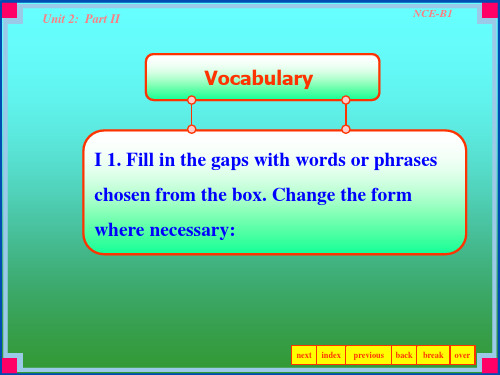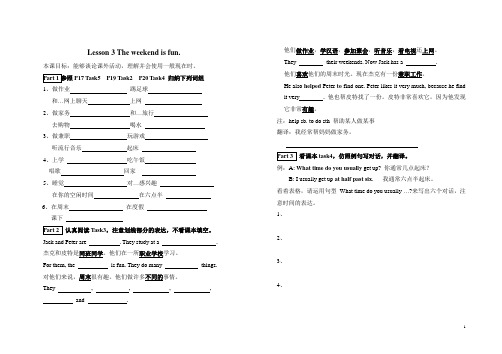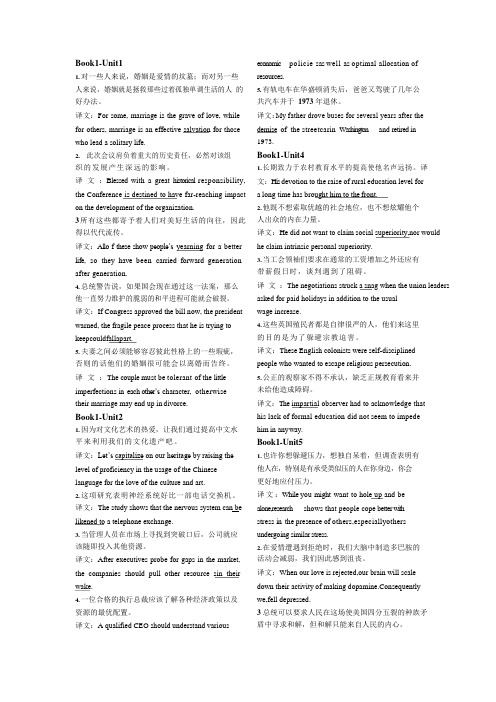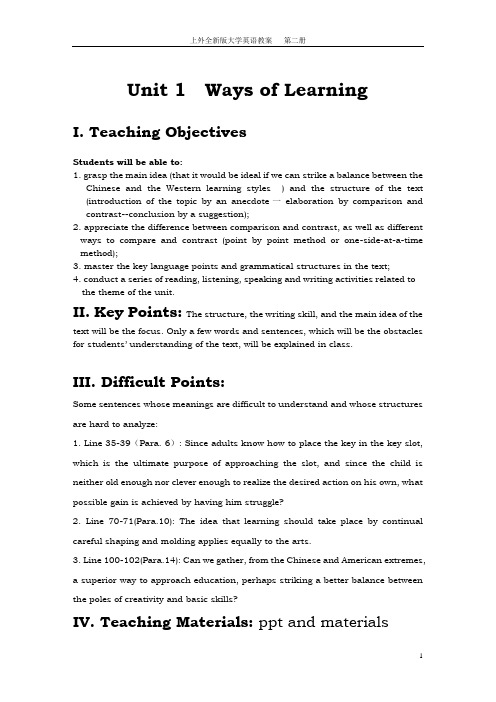综合英语book 1 unit 2
新编实用英语综合教程1第四版Unit2

道歉
原谅
遗憾,后悔 电子邮件
错误
Back
Unit | Two
Acting out the Tasks
Speak and Perform 2 Work in pairs and act out the tasks by following the above mini-talks.
1 Task: Give thanks to your hostess (女主人) for a happy New Year's Party.
祝贺 赢得;奖
自豪的
Unit | Two
Window on Key Words 建议
成功的
3) Expressing Thanks for Others' Help A: Professor Smith, thank you very much for your advice on my paper! B: It's my pleasure to be of some help. A: I could never be so successful without your help. B: I always know that you can do well. 4) Making Apologies to Others A: I'm so sorry for being late again. B: Never mind, but it's a lesson for you to learn. A: Please forgive me one more time. B: Oh, just see it doesn't happen again, will you? 5) Expressing Regret A: I'm sorry I didn't send the e-mail yesterday. B: Forget it. That's OK. A: I wish I could make up for it. B: I don't think it's your fault.
综合英语booke 1 unit_2 The fun they had

Background information
He taught biochemistry at Boston University, but he is most widely known for his science fiction. Some of his best-known works are I, Robot (《我,机器人》), published in 1950 and The Foundation Trilogy (《基地三部 曲》), published in 1951-1953.
Comprehension questions
What is the conversation concerned with? Why does Margie hate school? If your were Margie, what would you feel?
Home schooling
Group Discussion
Which kind of education do you prefer? School education or home schooling? State your reason.
Isaac Asimov(1920–1992) the author of the text, is an American biochemist and author. He was born in the former USSR on January 2, 1920. He was taken to the United States at the age of 3 and brought up in Brooklyn, New York. He graduated from Columbia University in 1939, and got his PhD. in the same university in 1947. prolific: more than 500 books
全新版大学英语综合教程1Unit2练习题及其答案

• available go ahead keep in touch • absolutely urge estimate reunion • hang out destination or something • go by every now and then mostly • know by heart right away reference
next index previous back break over
Unit 2: Part II
NCE-B1
1) He seemed to be still anxious about his failure in the examination. (on one’s mind)
It seemed that his failure _i_n_t_h_e__e_x_a_m_i_n_a_t_io_n__w_a_s_s_t_il_l_o_n___ _h_i_s _m__in_d_.___________________________________________.
next index back previous break over
Unit 2: Part II
NCE-B1
4) I am afraid I won’t be able to accomplish the project on time because something has unexpectedly happened.(come up)
中职英语_book1_unit_2 Lesson 3 The weekend is fun.l

Lesson 3 The weekend is fun.本课目标:能够谈论课外活动,理解并会使用一般现在时。
P17 Task5 P19 Task2 P20 Task4 归纳下列词组1、做作业踢足球和…网上聊天上网2、做家务和…旅行去购物喝水3、做兼职玩游戏听流行音乐起床4、上学吃午饭唱歌回家5、睡觉对…感兴趣在你的空闲时间在六点半6、在周末在度假课下认真阅读Task3,注意划线部分的表达,不看课本填空。
Jack and Peter are . They study at a . 杰克和皮特是同班同学。
他们在一所职业学校学习。
For them, the is fun. They do many things. 对他们来说,周末很有趣。
他们做许多不同的事情。
They , , , , and .他们做作业,学汉语,参加聚会,听音乐,看电视还上网。
They their weekends. Now Jack has a .他们喜欢他们的周末时光。
现在杰克有一份兼职工作。
He also helped Peter to find one. Peter likes it very much, because he find it very . 他也帮皮特找了一份。
皮特非常喜欢它,因为他发现它非常有趣。
注:help sb. to do sth 帮助某人做某事翻译:我经常帮妈妈做家务。
看课本task4,仿照例句写对话,并翻译。
例:A: What time do you usually get up? 你通常几点起床?B: I usually get up at half past six. 我通常六点半起床。
看着表格,请运用句型What time do you usually …?来写出六个对话,注意时间的表达。
1、2、3、4、5、 6、完成课本task5, 并写出它们的疑问句和否定句。
be 的用法 study 的用法疑问句:否定句:。
大学英语综合第一册第二单元答案

9) We had a family [reunion] where I saw relatives I hadn't seen for 20 years.
BOOK 1 - Unit 2 - Language Focus - Vocabulary
10) I guess Henry has been busy writing an article [or ssoommeetthhiningg]] recently. That's why he couldn't accept the invitation.
11) Scientists [estimate] that smoking reduces life expectancy by around 12 years on average.
12) Although it is unlikely that everyone will be able to come, they are still [going ahead] with the plan to hold a class reunion.
3) What was their conversation centered on [Their conversation was centered on the lifelong friendship between the driver and Old Ed.]
上外版综合英语1 Unit 2 the fun they had

crinkle n. thin folds or wrinkles vt. (cause sth to) have crinkles collocation: crinkle sth up
awful: adj. 1) (informal) very great e.g. That’s an awful lot of money! I’m in an awful hurry get to the bank. 2) Extremely bad or unpleasant, terrible e.g. An awful accident Awful weather Compare : awesome: adj. extremely good e.g. You look awesome in that dress. That’s awesome!
mechanical: adj.
Compare: 1)machine 机器 2)mechanic:someone whose job is repairing machines 技工 3)mechanical 机械的 4)mechanism: a part of a machine, or a set of parts that work together 机械装置
dispute:
Compare: Exercise on P29 Dispute:着重就分歧进行热烈的争论,“相持不 下”“未得到解决”的意味较强。及物动词。 e.g. Whether he will be elected as chairman is still disputed. Argue:着重“说理”“论证”“企图说服”,不及物动 词 e.g.: I argued with her for a long time, but she refused to listen to reason. Debate:着重双方各自陈述理由,“交锋”的意味较强 e.g.: We have been debating about the issue.
综合英语(翻译)

Book1-Unit11.对一些人来说,婚姻是爱情的坟墓;而对另一些人来说,婚姻就是拯救那些过着孤独单调生活的人的好办法。
译文:For some, marriage is the grave of love, while for others, marriage is an effective salvation for those who lead a solitary life.2.此次会议肩负着重大的历史责任,必然对该组织的发展产生深远的影响。
译文:Blessed with a great historical responsibility, the Conference is destined to have far-reaching impact on the development of the organization.3 所有这些都寄予着人们对美好生活的向往,因此得以代代流传。
译文:Allo f these show people’s yearning for a better life, so they have been carried forward generation after generation.4.总统警告说,如果国会现在通过这一法案,那么他一直努力维护的脆弱的和平进程可能就会破裂。
译文:If Congress approved the bill now, the president warned, the fragile peace process that he is trying to keepcouldfallapart.5.夫妻之间必须能够容忍彼此性格上的一些瑕疵,否则的话他们的婚姻很可能会以离婚而告终。
译文:The couple must be tolerant of the little imperfections in each other’s character,otherwisetheir marriage may end up in divorce.Book1-Unit21.因为对文化艺术的热爱,让我们通过提高中文水平来利用我们的文化遗产吧。
全新版大学英语综合教程第二册教案unit 1 book2

Unit 1 Ways of LearningI. Teaching ObjectivesStudents will be able to:1. grasp the main idea (that it would be ideal if we can strike a balance between theChinese and the Western learning styles ) and the structure of the text (introduction of the topic by an anecdote一elaboration by comparison and contrast--conclusion by a suggestion);2. appreciate the difference between comparison and contrast, as well as different ways to compare and contrast (point by point method or one-side-at-a-time method);3. master the key language points and grammatical structures in the text;4. conduct a series of reading, listening, speaking and writing activities related to the theme of the unit.II. Key Points: The structure, the writing skill, and the main idea of thetext will be the focus. Only a few words and sentences, which will be the obstacles for students’ understanding of the text, will be explained in class.III. Difficult Points:Some sentences whose meanings are difficult to understand and whose structuresare hard to analyze:1. Line 35-39(Para. 6): Since adults know how to place the key in the key slot,which is the ultimate purpose of approaching the slot, and since the child isneither old enough nor clever enough to realize the desired action on his own, whatpossible gain is achieved by having him struggle?2. Line 70-71(Para.10): The idea that learning should take place by continualcareful shaping and molding applies equally to the arts.3. Line 100-102(Para.14): Can we gather, from the Chinese and American extremes,a superior way to approach education, perhaps striking a better balance betweenthe poles of creativity and basic skills?IV. Teaching Materials: ppt and materialsV. Teaching Methods: Lecturing, practicing and discussing.VI. Teaching Timing: 8 sessions of classVII. Teaching Process:1st -2nd periods:Pre-reading; Teacher’s Introductory Remarks and Students’ Discussion related to the topic.3rd -4th periods: While-Reading (Understanding the title of text A; Analyzing the organization of the text; Explaining Difficult sentences and language points in the text; Summing up the main idea of the text)5th-6th periods: Dealing with the exercises after Text A. Check on Ss’ home reading (Text B); Post-Reading Task: Theme-Related Language Learning Tasks7th-8th periods: Listening and speaking tasks.A. Pre-reading tasksPre-reading tasks1.T asks Ss the following questions. The first is based on the song. Teach YourChildren: (5minutes )According to the song, who should teach whom? Is learning a one-way street?(Parents and children should teach each other and learn from each other. Learning is a two-way interaction.)Can you guess what the theme of this unit, ways of learning, refers to? (Different people have different learning styles)2. Ss listen to the fo11owing quotation from《文汇读书周报》(2001年12月1日第一版,"自主教育:“管”还是“不管”?) take some notes and then T will invite some Ss to summarize in English how Chen Yu hua’s parents handle her education.一本由中国经济出版社推出的《千万别管孩子一一自主教育哈佛启示录》的书近来极为畅销,问世才一月,在全国销售量已达到20余万册。
- 1、下载文档前请自行甄别文档内容的完整性,平台不提供额外的编辑、内容补充、找答案等附加服务。
- 2、"仅部分预览"的文档,不可在线预览部分如存在完整性等问题,可反馈申请退款(可完整预览的文档不适用该条件!)。
- 3、如文档侵犯您的权益,请联系客服反馈,我们会尽快为您处理(人工客服工作时间:9:00-18:30)。
Unit 2 FriendshipSuggested Teaching Plan (12 periods)ObjectivesStudents will be able to:1. Grasp the main idea (never delay expressing your true feelings to a friend) and structure of the text (developing a story around a letter);2. Appreciate the spoken English is much more informal than written English;3. Master the key language points and grammatical structures in the text;4. Conduct a series of reading, listening, speaking and writing activities related to the theme of the unit.Time allotmentBackground InformationHalloweenHalloween is celebrated annually. It is on the night of 31 October, when people once believed that ghosts could be seen. Now, in Britain and America, it is a time when children have parties, dress up as witches, make lanterns out of pumpkins from which the inside has been removed, and play “trick or treat ”.Trick or treat is a traditional activity at Halloween. Children dress in costumes and visit houses. At each house they say “ Trick and treat ”. This means that they will play a “trick ”, or joke, on the people in the house unless they are given a “treat ”, eg. sweets or money. Most people prefer to give treats rather than having tricks played on them.Teaching ProceduresPre-reading Task1. T asks Ss the following questions on the song That ’s What Friends are For:---What is a fair weather friend? (one who is happy to stay with you when things are going well but leaves as soon as trouble arrives)--- According to the song, what are friends for? (for both good times and bad times) (5 minutes)2. Survey--- Do you often write letters to friends?a) T writes down the following words on the blackboard: frequently, sometimes, rarely, never. Then ask the Ss to indicate how often they write to friends. b) Invite several Ss to give reasons for writing or not writing letters.c) Sum up and leads into the text by saying: Sometimes we put off writing letters because we think letters can wait until other matters are dealt with, or because we think a phone call will do instead. But sometimes, as you are to find in this text, we may leave it too late to write, and letters are best in expressing our innermost feelings. (15 minutes)While-reading Tasks1. Skimming1) Ss work in pairs to skim the text and find out how many questions the narrator asked the cabbie and what were the latter ’s responses.2) One pair of Ss perform the questions and answers for the class. Before doing so, T explains that they needn ’t read word-for-word from the text, but should use their own words to get the meaning across.3) T asks other Ss these question:--- At first, did you mistake Ed for the writer of this letter, like the storyteller did?--- When did you realize your mistake?--- Which round of question-and-answer leads to the mistake? (hint: the second round)4) T points out that a surprising ending is sometimes adopted in stories.2. Ss do Text Organization exercise. T may offer a clue that the last paragraph alone constitutes the last part. (5 minutes)3. T explains language points and gives Ss practice. (see Language Study ) (30 minutes)4. 1) T reads out the following sentences and Ss try to find out sentences of similar meaning in the text:--- Go on reading your letter. ( Go ahead and finish your letter.)--- I ’m not used to writing letters. ( I ’m not much of a hand at writing)--- We were friends since our childhood. So our friendship has a long history. (We were kids together, so we go way back.)2) T asks Ss which sentences are more colloquial, those in the text or those given by T.3) T explains that since this story is developed mainly through the conversation between the cabbie and his passenger, its language tends to be simpler and more colloquial, sentences tend to be shorter or even incomplete. (15 minutes)5. T explains language points in Part II and gives Ss practice. (see Language Study ) (30 minutes)6. Elicit from Ss several ways to keep a conversation going, eg., ask a question, agreeing with what one ’s conversation partner has said, making guesses about past events or predictions about future events. Ss scan Parts I and II to find out relevant examples employed by the narrator. (see Text Analysis ) (10 minutes)Post-reading tasks1. Ss work in groups to find out, in the conversation given in the text, words or sentences that take on different meanings for the speaker and the listener. And later, T may invited groups to report their findings to the class. (20 minutes)2. Guide Ss through some after-text exercises. (2 minutes)3. T checks on Ss ’ home reading (Text B ). (3 minutes)4. Ss do Part IV: Theme-related Language Learning Tasks in class. (1 Period)5. Ask the Ss to prepare the next unit:1) do the pre-reading task; 1st -2nd period3rd-8th period 9th -10th period 11th -12th period Pre-reading;While-reading(Paragraphs 1-21) While-reading (Paragraphs 22-36) Post-reading (Debate; Exercises) Check on students ’ home reading (Text B); Theme-related LanguageLearning Tasks2) preview Text A (2 minutes)Language Study1. be lost in/ lose oneself: be absorbed in, be fully occupied withe.g He was lost in playing computer games so he was unaware of my entering the room.She was lost in her novel.I had lost myself in thought.2. available: able to be used, had, or reachede.g Since 1990, the amount of money available to buy books has fallen by 17%.If you don’t want to buy a kite, you can make your own using direction available in the book.We have already used up all the available space.3. He sounded as if he had a cold or something: This sentence implies the sad state of mind the taxi driver was in.or something: used when you are not very sure about what you have just saide.g The air fare was a hundred and ninety-nine pounds or something.Here’s some money. Get yourself a sandwich or something.Similar phrase: or something like that.4. go ahead: continue, begin (sometimes followed by with + n.)e.g The board of directors will vote today on whether to go ahead with the plan.Henry will be late but we will go ahead with the meeting anyway.5. know/learn by heart: memorize, remember exactlye.g You have to know all the music by heart if you want to be a concert pianist.The pupils are required to learn a classic poem by heart every day.6. At least they do with me because I’m on the road so much.: At least letters from home mean a lot to me because I travel a lot in a car for long distances.7. estimate: form a judgment aboute.g I estimate that the total cost for the treatment of the disease will go from $5,000 to$8,000.Bill’s personal riches were estimated at $368 million.8. This isn’t family: This isn’t a letter from my family.9. might/may(just) as well:If you say that you might/may (just) as well do something, you mean that you will do it although you do not have a strong desire to do it and may even feel slightly reluctant about it.10. I’m not much of a hand at writing: I’m not good at writing.not much of a: not a goode.g Some people may think that doing housework for others is not much of a career.He is not much of a father, but he is an outstanding professor.11. keep up: continue without stoppinge.g They risk losing their homes because they can no longer keep up the repayments.I was so hungry all the time that I could not keep the diet up for longer than a month.12. correspondence:1) the act of writing, receiving or sending letter (不可加s,但可加a,often followed by with+n.)e.g His interest in writing came from a long correspondence with a close college friend.2) the letters that sb. receives or sendse.g Mary really never mentions her step-mother in her correspondence.Any further correspondence should be sent to my new address.13. But I take it he’s someone…: But I expect that he is someone…The sentence pattern “I take it (that)” is used to say that you expect someone will do something, know something etc.e.g I take it you’ve heard that all the students in my class have done a very good job in CET Band 4.14. practically: almost, but not completely or exactlye.g He’d known the old man for practically ten years.I know people who find it practically impossible to give up smoking.15. Went to school together? : The complete sentence is like this: You went to school together?16. neighborhood: one of the parts of a town where people livee.g It seemed like an ideal neighborhood to raise my children in.Houses in a good neighborhood are likely to be sold at a high price.17. kind of/sort of: a little bit, in some way or degreee.g She wasn’t beautiful. But she was kind of cute.The boy’s description kind of gives us an idea of what’s happening.18. lose touch: meet and contact sb. less often, gradually stop writing, telephoning, or visiting theme.g I lost touch with my former classmates after graduation.In my job one tends to lose touch with friends.19. a couple of: a few, more than one but not manye.g Do you have a moment? There are a couple of things I’d like to talk to you about.They promised the students that they would find a substitute teacher in a couple of days.20. But I realized that Old Ed was still on his mind when he spoke again, almost more to himself than to me.: But I realized that the taxi driver was still thinking of Old Ed when he spoke again. It seemed that he spoke more to himself than to me.on one’s mind: in one’s thought; of concern to one( if something is on your mind, you are worried or concerned about it and think about it a lot.)e.g Dealings on the stock market have been on his mind all the time.21. keep in touch (with sb.): If you keep in touch with someone, you write, phone, or visit each other regularly.e.g The old man kept in touch with his children while living in a nursing home.While doing the research work in the Antarctic, the professor kept in touch with his students via email.22. come up:1) happen, occur, esp. unexpectedlye.g “ sorry, I am late--- something came up at home.”Other projects came up and the emphasis of my work changed.2) be mentioned or discussede.g The issue of safety came up twice during the meeting.The term “project hope” has come up a lot recently in the newspapers.23. urge: try very hard to persuade (often used in the pattern urge sb. to do sth. Or followed by a that-clause. In the that-clause, “should” or the base form of a verb is used.)e.g They urged the local government to approve plans for their reform programme.I urged my cousin to take a year off to study drawing.Sir Fred urged that Britain (should) join the European Monetary System.24. postpone: delay (use. Followed by n./gerund)e.g The Russian expert postponed dumping Mir (和平号Russia’s space station) in the Pacific Ocean until March 23,2001.25. It had references to things that…: The letter made mention of things that…1) the act of talking about sb./sth., or mentioning them ( usu. Followed by to)e.g His recent book makes references to the political events of those days.It w as strange that he made no reference to any work experience in his resume.2) sth. That shows you where else to look for information, for example the page number of another place in a booke.g Make a note of the reference number shown on the form.3) the act of looking at sth. For informatione.g Use the dictionary for easy reference.Keep their price list for further reference.26. “Like it says there,”…” about all we had to spend in those days was time.”: “As the letter says there,”…“though we didn’t have much money we had a lot of free time.”27. absolutely: totally and completelye.g Funding is absolutely necessary if r research is to continue.There is absolutely no difference between the two oil-paintings.28. reunion: a party attended by members of the same family, school, or other group who have not seen each other for a long timee.g The soccer club holds an annual reunion.Before she went abroad for further study, the whole family had a big family reunion.29. …there are fewer and fewer still around.: fewer and fewer of us are left alive.30. go by: (of time) passe.g Her daughter was becoming more and more beautiful as the years went by.As each month goes by, the economic situation gets better.31. hang out:1) stay in or near a place, for no particular reason, not doing very muche.g I often hung out in coffee bars while I was unemployed.We can just hang out and hav a good time.That’s the corner where all the kids hang out.2) hang clothes on a piece of string outside in order to dry theme.g I was worried that I had no time to hang out my washing.What a pain!--- It’s raining and I’ve just hung the wash9ing out.32. every now and then: sometimes, at timese.g Every now and then I have a desire to quit my tedious job.I still see Jane for lunch every now and then, but not as often as I used to.33. But for the last 20 or 30 years it’s been mostly just Christmas cards.: But generally speaking we have sent only Christmas cards to keep in touch with each other for the last 20 or 30 years.34. Your friendship over the years has meant an awful lot to me, more than I can say because I’m not good at saying things like that.: Your friendship over the years has been very important to me, more important than I can say because I’m not good at expressing my feelings.awful: very great; very bad or unpleasante.g I have got an awful lot of work to do.I can’t bear the awful smell of cigarette smoke.35. chock up: become too upset to speake.g When he learned the news of his friend’s sudden death, he was so choked up he couldn’t say a thing.Losing my job left me completely choked up; I was so upset that I didn’t know what to say.36. destination: the place to which sb. is going or being sente.g Singapore is still our most popular holiday destination.Only half of the emergency supplies have reached their destination because of the bad weather.37. skip: pass from (one point, etc.) to another, disregarding or failing to act on what comes betweene.g The teacher skipped chapter five and said it wouldn’t be on the test.“As time is limited, we will have to skip some of the exercises in Unit 10,” said the teacher.Assignments:1) do the pre-reading task of the next:2) review Text A of the next unit.Comments:。
